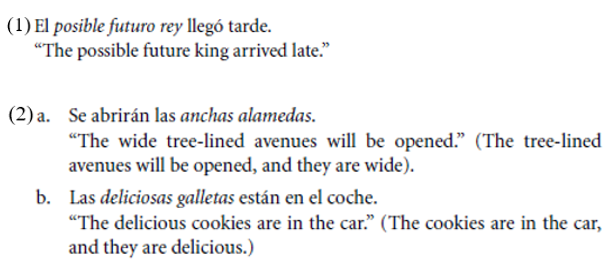


 Grammar
Grammar
 Tenses
Tenses
 Present
Present
 Past
Past
 Future
Future
 Parts Of Speech
Parts Of Speech
 Nouns
Nouns
 Verbs
Verbs
 Adverbs
Adverbs
 Adjectives
Adjectives
 Pronouns
Pronouns
 Pre Position
Pre Position
 Preposition by function
Preposition by function 
 Preposition by construction
Preposition by construction
 Conjunctions
Conjunctions
 Interjections
Interjections
 Grammar Rules
Grammar Rules
 Linguistics
Linguistics
 Semantics
Semantics
 Pragmatics
Pragmatics
 Reading Comprehension
Reading Comprehension|
Read More
Date: 2024-01-05
Date: 2024-01-13
Date: 2024-01-15
|
Non-predicative (prenominal) adjectives
First, consider (1). Recall that it has been shown in the section (Logical types of adjectives) that [−p] and [+p] adjectives differ interpretively. Given (1) in (Types of syntactic N–A relations), it can be claimed that [−p] adjectives receive the aforementioned intentional interpretation at SEM (the semantic module) once they Pair-Merge with nP. As a consequence of this merge, the members of the pair are then sent to Spell-Out, the last step in the derivation, and, at the same time, are interpreted according to both their intrinsic meaning and the position they occupy in the syntactic hierarchy.
Secondly, we have distinguished two subtypes of [−p] or prenominal adjectives, which give rise to the following readings: (i) modal and event modifier adjectives, with an intentional reading, as in (1) (recall also (ii) qualitative adjectives with a non-restrictive reading, as in (2).

These two types of readings have been described by Higginbotham (1985) as a case of (modal, intensionally oriented) modification of the attribute indicated by N, as in (2a), and as a case of “autonymous theta marking,” where the adjective saturates a denotational variable in N, as in (2b).
The relevant question now is how syntax (Pair-Merge) lays the basis for semantic interpretation. My claim is that in DPs with pair-merged adjectives these predicates combine semantically with elements in the semantic structure of n due to the effect of independent compositional rules that apply straightforwardly in adjunction configurations.1 More precisely, adjunction is the suitable syntactic correlate for certain compositional rules to the extent that adjuncts syntactically have a binding capacity, and semantically can be taken as one-place predicates whose arguments are present in the nominal. Descriptively speaking, these interactions between adjunct adjectives and nouns entail the following possibilities: First, the adjectives will have scope over spatiotemporal event arguments (e.g., circumstantial adjectives like antiguo ‘old’). Second, the adjectives will have scope over denotational variables (e.g., nonrestrictive qualitative adjectives like bonita ‘nice/pretty’) or over the “attribute” expressed by N (e.g., modal adjectives like presunto ‘presumed’ or restrictive adjectives like completo ‘complete’). Among the just mentioned putative elements in the semantic structure of N, event arguments do not need specific motivation. Nevertheless, it is obvious that the notion of “denotational variable” is left (deliberately) vague. Since it refers to the various aspects covered by the intension of the noun (tentatively: (i) properties “mentioned” by N, in the case of modal modification; and (ii) “distinguished” or particular properties of N, in the case of evaluative adjectives) we might think that this “denotational” variable is the R argument claimed to be bound by determiners when dealing with referential expressions (Longobardi 1994) or perhaps a world argument.2
The configuration in (1) correlates with this semantics since it involves, as in the case of Ernst (2002) for the treatment of adverbs, a scope-based approach to the position of non-predicative adjectives. This approach states that, in general, these adjectives must be the sister of (i.e., be adjoined to) a constituent with which they can establish the appropriate semantic relation (e.g., an eventive reading if n has an event argument). In this sense, the relation shown in (40) could be well adjusted to satisfy requirements of SEM at C-I.
1 A piece of evidence that these prenominal adjectives are adjuncts with a binding capacity – as opposed to postnominal adjectives – is that they have scope requirements that are violated if they do not occur in a given order.
2 One referee, wondering about the justification of this denotational variable, suggested that this notion could be implemented within a semantics where nouns do not have world arguments and where intentionality is handled in some indirect way. Unfortunately, for lack of space I cannot develop this suggestion any further.
|
|
|
|
للعاملين في الليل.. حيلة صحية تجنبكم خطر هذا النوع من العمل
|
|
|
|
|
|
|
"ناسا" تحتفي برائد الفضاء السوفياتي يوري غاغارين
|
|
|
|
|
|
|
وفد العتبة الكاظمية المقدسة يزور عائلة الشهيد البطل النقيب حارث السوداني
|
|
|